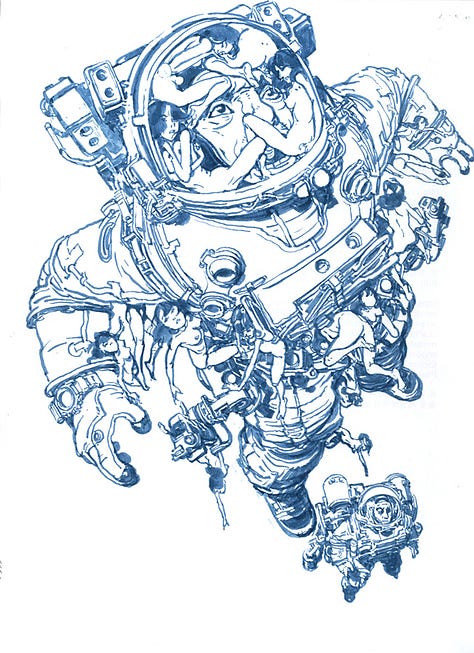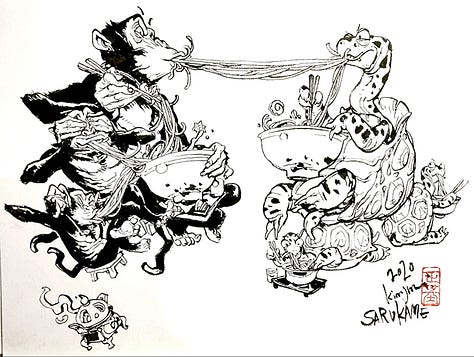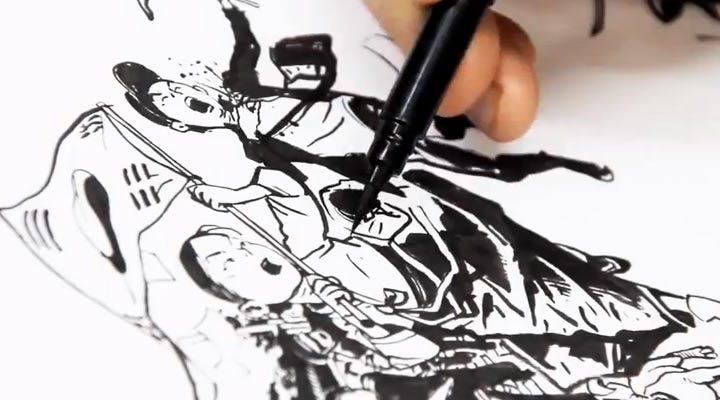Artificial Creativity
and an ancient phrase for "Despair."
Kim Jung Gi was a master artist.
For 47 years, Gi poured his soul into the art of drawing. No one worked harder than him; he was the epitome of passion and discipline, beyond prolific, with a brain like an encyclopedia and a brushstroke that was practically calligraphy.



He died in 2022, at the age of 47.
And 3 days later, his work was fed to an AI model.
Aside from the telltale mistakes - the subtle smudging, the dreamlike warping - the results were eerily similar. With this model, suddenly anyone could generate Kim Jung Gi originals.
Outrage followed, and the model was taken down (and since revived), but not before we all caught a glimpse of the future. Our life-long journeys as creators - our dreams, our pain, the thousands of hours spent in exploration, the failures and the breakthroughs - could, it seemed, be stolen, shredded, reassembled and made to walk again. Strange, that technology could be used to manufacture something so ghoulish.
“I would never wish to incorporate this technology into my work at all. I strongly feel that this is an insult to life itself.” - Miyazaki
Brother, preach.
Don’t worry, I’m not going to be all doom and gloom (he said, starting the article with death), and I won’t be writing an essay all about AI (not that I haven’t tried). The AI revolution is far too large for me to take on in a 3-minute newsletter, and once I start talking, I may never stop.
As an artist, however, I do need to address it. Just yesterday, I was mentioned on social media by several people who saw a piece of AI art that bore a striking resemblance to my work on Marvel Anatomy:
The whole book is full of images like this, and doubtless most of them have been “scraped” (ie ingested) by AI already. And while the computer-made version might not be entirely sensical, there’s no denying that it boasts a level of detail and intricacy that would take a professional like myself many, many hours to match… and it achieved this with a handful of words and a click.
When I entered the conversation, I was immediately attacked by a few “gentlemen” who told me that a) my work was in no way stolen or involved and b) I shouldn’t be jealous because AI “drew it better.” One helpful Samaritan even suggested I use the competition as a way to “dig deeper and be more original,” and that artists shouldn’t expect money or food, they should do it “for their soul.”
I wrote a few scathing responses. Then I deleted them, and left.
Wait, I promised this wouldn’t be a downer! Here’s a picture of Quiet wearing a helmet two sizes too big:
Listen, AI is incredible. It has the potential to bring about truly amazing, nigh-miraculous improvements, including in the realms of medicine and climate change (which is what I try to focus on in my darker moments).
But I cannot help but regard the mass-production of digital “art” with anything less than… well, let’s not call it “despair,” because that’s a sad word. Instead, we’ll call it “sparré-fluf,” an ancient term that I just made up, which translates (more or less) to: “a ruffling of the feathers of happiness.”
Because art is supposed to be about human expression. It’s supposed to be about discipline, struggle, and growth, because that’s what life is.
I won’t be using AI in the production of Quiet: Level One.
But… is that foolish? My industry is in turmoil. The layoffs have already begun. A new study estimates that 204,000 entertainment jobs across the United States will be affected by AI over the next three years alone.
I’m connected to a lot of these folks online. As you might imagine, they too are suffering from sparré-fluf.
Like many of us, I’m wondering how I’ll survive in the years ahead. And if I’m to stay competitive… will I not need to adapt AI into my workflow?
Probably. Eventually. And then the question will be: how much control am I willing to give up?
For now, I’m going it alone the old-fashioned way, because the stories I have to tell can still only be told by me, and the art is still mine to make. And Quiet’s best days are still very much ahead of them.
Grateful, as ever, to have you with me.
Jonah
(PS: This article was written by Chat GPT)
(PPS: For anyone who’d like to read more about my views on art and the nature of creativity itself, check out this article I wrote about Adam Adamowicz, a brilliant concept artist who I had the privilege of working with back in my video game days. The article is about discipline and creativity; vital components of any creator. Adam died at the age of 43.)







I remember distinctly the moment you're talking about. I love Kim Jung-Gi, I have a massive print of his on my wall. When I saw that person promote their AI I think it's the closest I've come to wanting to beat somebody with a branch. Same thing happened to Kevin Conroy when he passed away.
It's just so frustrating. Realizing all the talks KJG did, all the demonstrations, public drawings, etc. failed to reach these people. Failed to inspire them to pick up the pen, failed to get them to try, failed to reach their spirit. They missed the ENTIRE point of his career, so obsessed with the end result they'd rather not even try to get there. Just trying to skip to the very end to have lines on a paper. They say they want to create but have no desire to actually create the thing, they just want a product they can hawk or praise they can steal.
Is it over the top that I go to therapy because of AI? Propably, but few days ago I had a nightmare that someone took my face to wear it as a mask, because this is pretty much how the situation feels like for me, even if you take the monetary part out of the picture. My feathers are more then a bit ruffled, "Weltschmerz" is the word that feels more appropriate for me.
I just hope that there will be a place for us somehow, somewhere in the future. Even if I dont see it in the industry any longer.